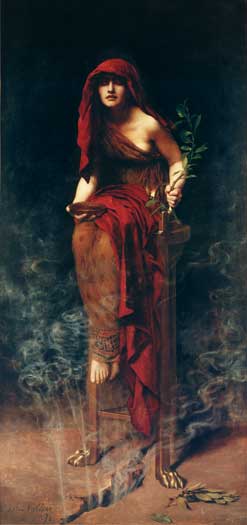 Submitted by Mr. Mike on
Submitted by Mr. Mike on

The uncanny ability we call clairvoyance takes many forms from a vague awareness of a distant event to a vivid revelation. The definition of clairvoyance is:
Extra-sensory knowledge about material objects or events which is not obtained from another person’s mind.
In other words, it is not simply telepathy. For ordinary people, clairvoyance is most likely to occur in stressful situations or when people or places connected with them are in danger. Throughout history those with clairvoyance we sought out for other reasons usually having to do with power.
In ancient times clairvoyants were known as oracles and their visions were subject to as much scrutiny as they are today. Two and a half thousand years ago Croesus, the fabulously rich king of Lydia, conducted a fascinating psychic experiment to test the powers of seven oracles, six Greek and one Egyptian. According to the historian Herodotus, the king was becoming increasingly alarmed at the power of the Persians and decided to consult an oracle as to what course of action he should take.
But which one could he trust?
He decided to test them all.

He sent out seven messengers, one to each oracle, instructing them that on the hundredth day each should ask his oracle, “What is King Croesus, son of Alyattes, now doing?”
Their answers were to be written down and brought back to the King. Only one of the answers, the most accurate, remains on record.
The oracle at Delphi, the Pythoness, as she was called, induced her prophetic trances by sitting over a volcanic fault and inhaling the fumes while chewing mulberry leaves. The moment the Lydian messenger entered her sanctuary, she answered him, without even hearing his question, in verse:
I can count the sands, and I can measure the ocean;
I have ears for the silent and know what the dumb man meaneth;
Lo! On my sense there striketh the smell of a shell-covered tortoise,
Boiling now on a fire with the flesh of a lamb in a cauldron –
Brass vessel below, and brass the cover above it.
After sending his messengers to the oracles, the king set about deciding on what would be the most improbable thing anyone could conceive him of going. On the appointed day he took a lamb and a tortoise, cut them to pieces with his own hands, and boiled them together in a brass cauldron covered with a brass lid.
Not surprisingly, the clairvoyance of the oracle at Delphi got her the job as psychic advisor to the king.
Exerpt by Roy Stemman
Mysteries of Mind, Space and Time, Vol. 8
- 892 reads